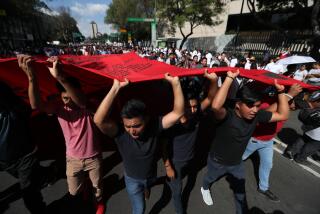Poland’s President Forgiving on Martial Law
- Share via
WARSAW — A 1981 crackdown by Communist authorities against the Solidarity pro-democracy movement was “evil,” but Poles should understand and forgive those who imposed it, President Aleksander Kwasniewski said Thursday at a 20th anniversary commemoration.
Martial law, imposed Dec. 13, 1981, by Gen. Wojciech Jaruzelski, “was evil because it was directed against the rebirth of freedom, and evil because its effect was the crushing of reawakened hopes for life and dignity, for civic rights, for democracy,” Kwasniewski said.
“Martial law also meant the internment of thousands of Solidarity activists, forced pacification of enterprises, hundreds of political trials, searches, wiretaps, detentions, persecution, throwing people out of work and attacks against activists of the underground opposition,” he said. “How many smart, hard-working and honest people were forced to emigrate as a result of that oppression! It is impossible to make up for the harm done then.”
But Kwasniewski said he does not question the patriotism of Jaruzelski and other Communist leaders who imposed martial law. They were justified in the fear they cite in their defense, he said: that if they hadn’t suppressed the pro-democracy movement, the Soviet Union would have invaded Poland, as it had Czechoslovakia in 1968.
“The Polish authorities had the right not to trust the eastern neighbor. In such a situation, could the entry of ‘friendly’ troops be excluded?” he said in the keynote speech at a daylong forum held at the government’s Institute of National Remembrance, set up last year to examine the history of Nazi- and Communist-era crimes in Poland.
The popular president, who easily won reelection last year, is himself a former Communist. He was among party members who in 1989 successfully argued for a peaceful transition to democracy rather than a renewed crackdown on Solidarity. The movement’s leader, shipyard worker Lech Walesa, won the Nobel Peace Prize during the struggle and went on to become Poland’s president in 1990.
The issue of martial law remains deeply divisive here. Many who suffered remain bitter, but Jaruzelski’s argument that he acted out of patriotism also draws considerable support. A recent poll by the respected CBOS agency found that 51% of respondents called the imposition of martial law “just” and 25% viewed it as “unjust.”
In 1989, Jaruzelski reached a deal with Solidarity that set the stage for peacefully dismantling communism. As part of that agreement, he served as Poland’s president in 1989 and 1990. Jaruzelski, 78, lives in retirement in Warsaw. But he faces an ongoing trial--not for the imposition of martial law, but on charges that in 1970, as defense minister, he ordered troops to fire on striking shipyard workers.
Many observers view that trial primarily as a battle over how Jaruzelski’s legacy should be perceived, rather than as a serious attempt to put him in jail.
In a recent statement, Jaruzelski argued that martial law “was our salvation, a lesser evil than the realistic threat of a multidimensional catastrophe.”
Bitter critics of the crackdown argue that the widespread acceptance of what Jaruzelski did marks the continuing weakness in the foundations of Poland’s democracy.
“After 20 years, most people forgot, or don’t remember with full freshness, all the horrible amount of suffering, violence, aggression against the people, killing, beating, firing people from their jobs,” said Pawel Machcewicz, director of public education at the Institute of National Remembrance. “It’s not as vivid as it used to be 15 years ago. . . . This is very dangerous, for a new democratic country to forget what has been done before in the dictatorship.”
But Kwasniewski, in his speech, argued that it was only in 1989, after great political changes in the Soviet Union, that a peaceful transition to democracy in Poland became possible. Because of this, the violence of martial law should be forgiven, he said.
More to Read
Sign up for Essential California
The most important California stories and recommendations in your inbox every morning.
You may occasionally receive promotional content from the Los Angeles Times.










